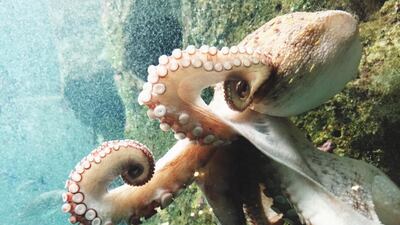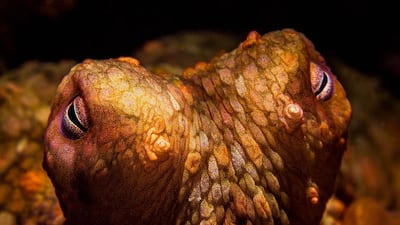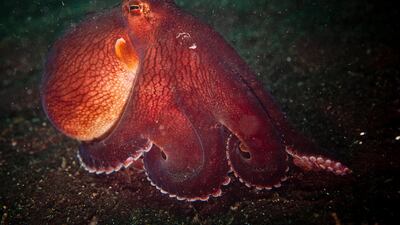An octopus made headlines for lashing out at a man on an Australian beach.
Geologist and author Lance Karlson was about to take a swim in Geographe Bay, on Australia's south-west coast, when he spotted what he thought was the tail of a stingray emerging from the water.
On closer inspection he realised it was an octopus – and an apparently angry one, at that.
A video of the encounter, which went viral, shows the animal striking out at Mr Karlson with one of its tentacles.
But could the octopus really have taken a such a strong disliking to him?
Octopuses are known to be intelligent – about as smart as a golden retriever, according to one estimate.
They have been known to escape from their aquarium tanks and find their way back to the sea, as one did in New Zealand by using a drainage tube.
They can also open jars from the inside, or outside.
And they have been known to create games for their amusement.
One octopus in Germany was said to repeatedly shoot water at a spotlight overhead to knock out the light to watch the mayhem that unfolded.
They used to be thought of as solitary but are now believed to be quite social.
Keepers say they have different personalities, and they can “occasionally” take a disliking to someone, said Sy Montgomery, an octopus expert.
He described how one octopus at the New England Aquarium would squirt a volunteer with water whenever it got the chance.
"Using his funnel, the siphon near the side of the head used to jet through the sea, Truman [the octopus] would shoot a soaking stream of saltwater at this [volunteer] whenever he got a chance," wrote Mr Montgomery, in Orion Magazine.
“Later, she quit her volunteer position for college. But when she returned to visit several months later, Truman, who hadn’t squirted anyone in the meanwhile, took one look at her and instantly soaked her again.”
Researchers have even measured differences in the personalities of octopuses in experiments, studying 44 East Pacific red octopuses in tanks in 1999.
They opened the tank every other day for two weeks and touched the octopuses with a test tube brush before offering them crabs to eat.
They recorded 19 separate responses. Another study from 1993 observed different personality types in octopuses, with some responding passively, and others inquisitively, according to the BBC.
The animals have been known to attack humans before, such as when one woman in the US draped an octopus on her face for a picture.
It dug its suckers in and bit her "not once, but twice. It was like a barbed hook going into my skin," Jamie Bisceglia told King 5 News after the encounter in 2019.
One large team of researchers suggested in a peer-reviewed article that the creatures may be aliens from outer space, after a meteor brought alien viruses crashing down to earth, infecting a population of primitive squid, which evolved into octopuses.
"Its large brain and sophisticated nervous system, camera-like eyes, flexible bodies, instantaneous camouflage via the ability to switch colour and shape are just a few of the striking features that appear suddenly on the evolutionary scene," they wrote.
Whatever the truth, octopuses are certainly different in some ways, biologically speaking.
They have three hearts and multiple brains, for a start.
And about 10 per cent of their genes do not have a match in other animals.
"Octopus bimaculoides [has] about 2.7 billion base pairs," Carrie Albertin, a graduate student in biology at the University of Chicago, told The World, a public radio news magazine and podcast in the US.
“That’s about 90 per cent of the size of the human genome, which is about 3.2 billion. This is many times bigger than the genomes of other animals.”









